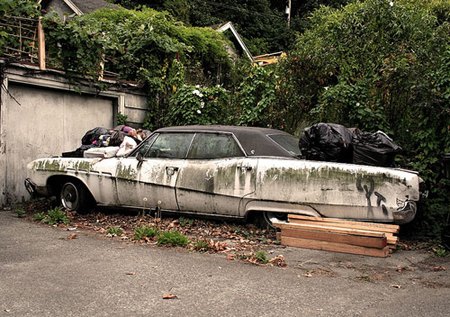Editorial: Cash for Clunkers Bill Heading for Trouble. One Hopes.
It seems straightforward enough: federal vouchers for old clunkers. Takes old heaps off the road. Stimulates new car sales. Done. Of course, we are talking about a government program here. And that means that H.R. 1550, the “ Consumer Assistance to Recycle and Save Act of 2009,” has quickly become a cat fight amongst interested parties (manufacturers, dealers, dismantlers, after-market parts makers, trade protectionists, etc.). If passed, 1550 will surely evoke the law of unintended consequences. At the moment, the bill’s been referred to the House Transportation and Infrastructure committee, so that august body can breathe their magic upon it. Ahead of that joyful event, 1550 contains some HIGHLY contentious sections. How about a stricture for the new car purchase that stipulates different minimum levels of highway fuel economy depending on whether the vehicle was manufactured in the United States or “North America” (i.e., Canada or Mexico)? Yes, way.
The money shot: Section 3 mandates a $4K voucher for “passenger automobile assembled in the United States with a minimum highway label fuel economy of 27 miles per gallon.” The same four grand goes to “passenger automobile assembled in North America with a minimum highway label fuel economy of 30 miles per gallon.” I guess our neighbors to the north and south must. Try. Harder.
If the new “passenger automobile assembled in the United States” achieves that same [higher] 30 miles per gallon highway mpg standard, the US vehicle gets an extra grand: a $5K voucher. Oh, and if that “passenger automobile assembled in the United States” happens to be an electric or plug-in electric vehicle, the voucheree scores $7500. At the moment, the money would go to someone looking at a $100K+ Tesla Roadster or one of those NEV golf cart thingies.
AND if the new “passenger automobile assembled in the United States” only achieves 24 mpg highway, don’t worry too much. The feds would like to present you with a $3K voucher.
The bill also stipulates a lower minimum for trucks, ’cause we don’t want to leave out trucks, a domestic mainstay, do we? “Non-passenger” vehicles must achieve “only” 24 miles per gallon highway to qualify for that $5K voucher. [Look for some tall ass gearing if this passes.]
As for the imports—Saturn Astra, Toyota Prius, Honda Fit, etc.—their buyers are SOL, voucher-wise. Which, of course, threatens to evoke a trade war. Which could well be the last thing the US economy needs right now [see: Great Depression].
As for the cost to dealers and dismantler of making all these sales, which should generate some kind of profit, 1550 throws in $50 per transaction. Hey, why not? It’s not as if the dismantling industry has a history of title washing or any sort of thing. And while we’re on the subject, who’s in charge of making sure all the clunkers are crushed, the toxic waste removed and the registrations destroyed? Uh . . .
At the moment, the Automotive Aftermarket Industry Association (AAIA) is 1550’s most vociferous opponent. Well they would be, wouldn’t they? Aaron Lowe, the org.’s vice president of government affairs for the AAIA, sent out a press release countering any suggestion that their opposition has anything to do with their members’ profits.
“Proponents of the Cash for Clunkers bill say that it will benefit the environment because it will take older cars off the road, replacing them with new, more fuel efficient vehicles… What will become of all these old cars? The answer you don’t hear from the backers of Cash for Clunkers is that these scrapped vehicles will more than likely be sent to landfills, creating more pollution, not less.”
The AAIA has created a website— fightcashforclunkers.com—to carry their banner forth. While there’s a debate to be had about the relative pollution of old vs. new, let’s file this one under Where’s MY NSFW Bailout?
The Cash for Clunkers program would earmark federal funds for car owners to trade-in their sport utility vehicles in exchange for vouchers to be used to obtain newer, more fuel efficient vehicles. On the surface the program may sound reasonable, but its consequences will increase the nation’s carbon footprint, create issues for those not fortunate enough to afford the cost of a new vehicle and be a waste of taxpayer dollars.
The Fight Cash for Clunkers organization… instead favoring tax credits to help upgrade, repair or maintain older vehicles, as well as tax deductions for interest on car loans and state sales tax.
Death would be too good for this bill. And the idea that the feds should do something, ANYTHING, to stimulate the US new car market is sadly, badly mistaken. The best thing our government could do for the UScar industry is to let Chrysler and GM go C11 and/or C7. The resulting flood of new, highly discounted product will drive down prices and, perhaps, encourage buyers to trade-in their old cars for new.
More by Robert Farago
Latest Car Reviews
Read moreLatest Product Reviews
Read moreRecent Comments
- Formula m For the gas versions I like the Honda CRV. Haven’t driven the hybrids yet.
- SCE to AUX All that lift makes for an easy rollover of your $70k truck.
- SCE to AUX My son cross-shopped the RAV4 and Model Y, then bought the Y. To their surprise, they hated the RAV4.
- SCE to AUX I'm already driving the cheap EV (19 Ioniq EV).$30k MSRP in late 2018, $23k after subsidy at lease (no tax hassle)$549/year insurance$40 in electricity to drive 1000 miles/month66k miles, no range lossAffordable 16" tiresVirtually no maintenance expensesHyundai (for example) has dramatically cut prices on their EVs, so you can get a 361-mile Ioniq 6 in the high 30s right now.But ask me if I'd go to the Subaru brand if one was affordable, and the answer is no.
- David Murilee Martin, These Toyota Vans were absolute garbage. As the labor even basic service cost 400% as much as servicing a VW Vanagon or American minivan. A skilled Toyota tech would take about 2.5 hours just to change the air cleaner. Also they also broke often, as they overheated and warped the engine and boiled the automatic transmission...


































Comments
Join the conversation
Fisker EV?
'The same four grand goes to “passenger automobile assembled in North America with a minimum highway label fuel economy of 30 miles per gallon." 'As for the imports—Saturn Astra, Toyota Prius, Honda Fit, etc.—their buyers are SOL, voucher-wise. Which, of course, threatens to evoke a trade war.' A pretty good percentage of Toyotas are assembled in America. And this bill isn't going to pass anyway.